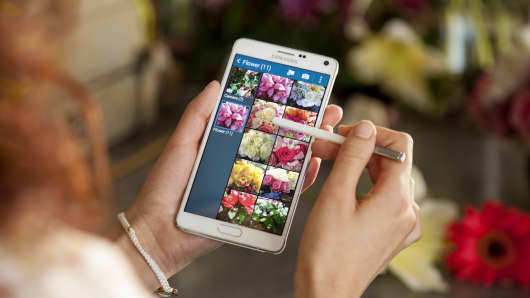With Apple's iPhone release, pundits have been debating the impact of the new iPhone on Samsung's fortunes. It's an understandable debate as Samsung is the largest and most capable competitor to Apple in terms of capturing market share. But Samsung has a bigger problem that is not easily overcome —
You might be surprised to learn that Google is a significant problem for Samsung given that Samsung uses the Android operating system in its smart phones.
But here's the problem for Samsung: Google regularly undercuts Samsung's offerings by selling unlocked devices (without so-called bloatware) often directly to consumers. It must be driving Samsung crazy.
Read MoreUnboxing the new Apple iPhones—let's open it up!
While Samsung attempts to layer on their own operating-system cosmetics through a system called TouchWiz, it's essentially Android. If the Galaxy S5 sells for $700 and a similar product is released by Google for $500 direct to consumers, where is the long-term experience differentiation for Samsung? Hardware certainly can provide a difference as indicated by the larger Note phone, but the core operating system is what you are experiencing on a regular basis as you utilize the device. So, from an operating system perspective, the devices are essentially similar. Except Google's device cost $200 less and you are not on a contract with the particular wireless provider.
Competitive moats are important for businesses if they wish to maintain margins. A moat is a differentiation that is not easily replicated that allows a company to charge higher prices and maintain market share.
Apple is a perfect example of a moat company and they use their differentiation to charge higher margins on their products. Samsung is desperately trying to increase the width of the remote but Google isn't making their life any easier as they seek to differentiate into their brand.
Read MoreApple: We're not shutting down Beats
This is exactly why Samsung is attempting to develop their own operating system called Tizen that will supposedly be released as a competitive operating system to Android and iOS. Unfortunately for Samsung, Tizen continues to be delayed and all indications are that the operating system is not ready for prime time. This is understandable given the challenges that companies face in launching new operating systems. It is not easy creating a new ecosystem.
Remember Symbian? How about BlackBerry? Both of these operating systems struggled in part because of a lack of significant applications available in their respective app stores. The Windows operating system is finally gaining momentum in terms of apps but at one point did not even include Skype which is owned by Microsoft! You can see the problem.
Read MoreThiel: I like Google better than Apple
So, as Samsung struggles to develop their own operating system, they flood the market with new products. Half a dozen watches, two versions of the Samsung Note, two versions of the Galaxy S5, Samsung Alpha, Samsung Galaxy Mini, etc. etc. Throwing hardware to capture market share is a costly strategy but Samsung is forced to do their best to innovate on hardware because they have no operating system differentiation. It's a difficult position to be in when you are chasing a strong competitor in Apple and forced to utilize the same core operating system as a competitor who consistently undercuts you on hardware price (Google).
Samsung is in a tough position to be sure. Its stock price has lagged while Apple has soared. Now you know why.
Commentary by Michael A. Yoshikami, the CEO and founder of Destination Wealth Management in Walnut Creek, California. He is also a CNBC contributor.
Disclaimer: Michael Yoshikami has no personal ownership of Samsung, Apple or Google. Destination Wealth Management doesn't buy Samsung or Google but buys Apple for client accounts.
Read MoreJapanese firm to build space elevator by 2050
Correction: The Nexus X has not yet been released.


